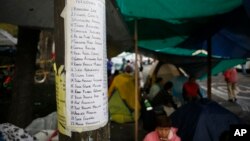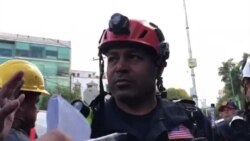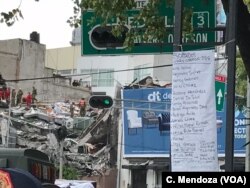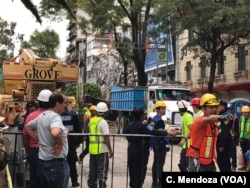Rescue teams in central Mexico have been working around the clock among the flattened buildings since Tuesday's massive 7.1 magnitude earthquake in search of survivors.
Mexican rescue workers, supported by teams from around the world, including Israel, Japan and the United States, have rescued at least 60 people in Mexico City and surrounding towns.
Authorities have raised the death toll from Tuesday's earthquake to 293, as rescue teams carefully comb through the rubble of Mexico’s most deadly earthquake in decades, refusing to give up hope of finding survivors.
National Civil Protection Chief Luis Felipe Puente said more than half the fatalities — 155 people — died in the capital, Mexico City. In a tweet Friday, he said the death tolls remained unchanged in other areas, with 73 in the state of Morelos, 45 in Puebla, 13 in Mexico state, six in Guerrero and one in Oaxaca.
WATCH: Rescuers Describe Conditions in Mexico
More than three days after the quake, rescuers were now finding more dead bodies than living survivors, but officials said there were signs of life at some sites picked up by dogs and sensors. The Mexican military said 115 people had been pulled alive from the rubble.
President Enrique Pena Nieto has insisted rescue operations will continue. He praised Mexicans' rapid response to the disaster, while stressing the priorities remain saving lives and getting medical attention to those in need.
"I need to recognize the volunteers who are unconditionally helping those who need it," Pena Nieto said.
"Once again, Mexicans have demonstrated that the strength of solidarity is much greater," the president's office posted in a tweet that included a video showing thousands of people involved in relief efforts.
But it was likely the death toll would rise.
In addition to the local response in Mexico City and the states of Morelos, Puebla, Mexico, Guerrero and Oaxaca, help was coming from other nations.
The U.S. Agency for International Development sent a team of more than 60 disaster responders and tools and medical equipment to Mexico City on Thursday.
“They'll be working closely with Mexican disaster authorities to help rescue earthquake survivors and assess structures for earthquake damage," USAID Administrator Mark Green said.
While officials remained focused on searching for survivors and caring for those who were injured in the temblor, those whose lives were upended in the quake were wondering what would happen to them.
About 2,000 homes were damaged in the quake. Many are uninhabitable, rendering occupants homeless.
Mexico has set up 50 shelters to house quake survivors, but some people are choosing to sleep in the streets.
WATCH: Rescuers Cling to Hope of Finding Survivors
The quake hit less than two weeks after another temblor killed more than 90 people in the country's south. The U.S. Geological Survey said the two quakes appeared to be unrelated.
The earthquake struck exactly 32 years after an 8.0 temblor killed nearly 10,000 people in and around Mexico City.
Celia Mendoza contributed to this report.










